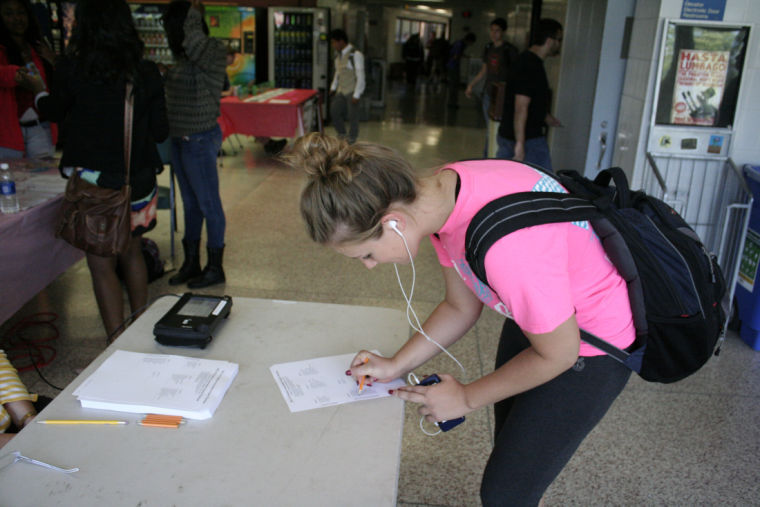SA Senate looking for ways to improve elections turnout
Kelly Iseli, sophomore electrical engineering major, places her vote tuesday for the Student Association Senate at DuSable Hall in September 2013.
February 12, 2015
The Student Association Senate is considering implementing online voting and spring elections to boost student awareness and participation in SA Senate elections, said SA Senate Speaker Dillon Domke.
SA Senate elections turnout has been declining: 720 students voted in the fall while 750 voted in 2013, 675 in 2012 and 937 in 2011. SA executive elections have seen a higher, growing voter turnout, with 2,600 students voting in spring 2014, 1,500 in 2013, 750 in 2012 and 1,189 in 2011, according to a March 27 Northern Star article.
Spring elections
Domke said he would like to see a combined executive and Senate election, but he said concerns have been brought up about potential unethical teaming up.
“What we’re afraid of is what the effects would be of a jumbo ticket where senators were running with executive members,” Domke said.
If Senate and executive candidates were elected on the same ticket, Domke said students may be biased and not utilize “checks and balances” when making their vote.
Dathian Ferguson, junior Spanish translation major, said he hasn’t vote in SA elections and doesn’t understand the point of moving the elections to the spring if there is no guarantee the numbers will change.
Switching the Senate elections to the spring from the fall would raise votes simply because more people will campaign for it, Domke said, as well as the fact that executive elections garner higher voter turnout than Senate elections.
“The more people there are out there the more people you’re going to reach and the more people that are going to come out and vote,” Domke said.
The changes, if they are implemented, would be made in spring 2016 so no one would be left unprepared by changing procedures halfway throughout the year, Domke said.
Online voting
Students have conflicting schedules with the hours the polls are open for elections, leading the Senate to look into supplementing in-person voting with online voting, Domke said.
“Everything is online, so I think it would be convenient,” Domke said.
Voting would not be made exclusively online, Domke said, as coupling online and in-person voting would allow students who just vote because they’re passing by the polls to participate.
Sophomore communication major Lashawn Green said online voting is better than in-person voting because it’s easier to vote online than to go to campus to do so.
Increasing participation
Domke said advertising campaigns for SA Senate elections have been unsuccessful in the past, so the Senate is trying to come up with a new approach to interest students in voting. Ideas include sending representatives to organization like the Residence Hall Association meetings and UNIV 101 classrooms to encourage students to vote.
In order for a student to have his or her voice heard, he or she must vote to get accurate representation, Domke said.
“We’re spending your money for you, and the way you get a say in that is electing who you want to be your voice,” Domke said in regard to the SA’s $7 million budget, which comes from student fees.







